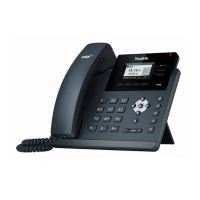Phone Customization
183
Dsskey->Ext Key->Ext KeyX->Line
[1]]
X is the expansion module ID, Y is the EXT key ID. For T54S/T52S, X=1-3, Y=1-60; for T48S/T48G/T46S/T46G,
X=1-6, Y=1-40; for T29G/T27P/T27G, X=1-6, Y=1-20, 22-40.
Enhanced DSS Keys
Enhanced DSS Keys (EDK) enables users to customize the functions of a phone’s DSS keys. You can use
EDK to assign frequently-used function to DSS keys or to create menu shortcuts to frequently-used
phone settings as need.
Application scenarios involve the following:
Adding new DSS keys to simplify the operation of common telephony tasks that may need more
than one key press with the default configuration.
Removing certain default DSS keys for the functions that may be redundant or never used.
The rules for configuring EDK for DSS keys are different. Before using EDK, you are advised to become
familiar with the macro language.
For more information on Enhanced DSS Keys, refer to Using Enhanced DSS Keys on Yealink IP Phones.
Topics
Some Guidelines for Configuring Enhanced DSS Keys
Macro Action Strings
EDK Configuration
EDK List Configuration
EDK Prompt Configuration
EDK Soft Keys Configuration
Example: Configuring EDK List for a Line Key
Some Guidelines for Configuring Enhanced DSS Keys
The following guidelines will help you to configure EDK efficiently:
Activation of EDK functions requires valid macro construction.
“$” character delimits the parts of the macro string (except the digits only) and it must exist in pairs.
For more information, refer to Macro Action Strings.
Macros can be invoked in the format “!<macro name>”, where <
macro name
> is defined by the
parameter “edk.edklist.X.mname”.
If there are two or more same macros, the soft key or DSS key will invoke the macro with a smallest
value of X defined by the parameter “
edk.edklist.X.mname
”.

